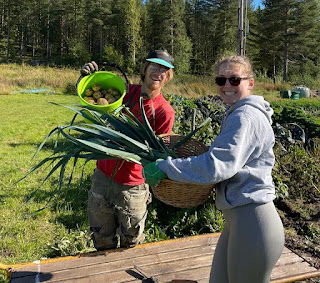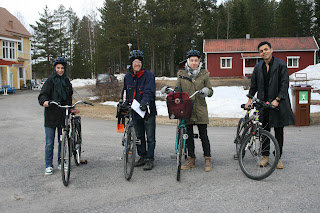 |
| Josh and Alicia harvest potatoes and Leeks |
One of our goals for the Go(o)dSeed project is to use care for God´s creation. We see this as a very clear calling we have as followers of Jesus. The health of the earth is in crises, and thus even the health of human beings is in crises! Our own health and the health of the earth and all of it´s creatures are connected. As a part of the our learning process, we are currently reading a book together called "Making Peace with the Land" (by Fred Bahnson and Norman Wirzba). In the first chapter the author writes, "Human life simply makes no sense apart from the life of all creation. We live only because the worms, plants and bees do too. And they live because God loves them."
One of the ways that we believe that we can actively contribute to caring for God´s creation is through how we eat. We believe that eating is actually a very deeply communal and ecological act, and even sacred when we look at it from a theological perspective. It is not just something we do to satisfy our hunger. Eating is a very simple way that we can be aware of our connection and dependence on the earth, as well as being reminded through each meal that we prepare and eat together that food is a gift of God´s abundance.
 |
| Valeria and Alicia harvest potatoes |
Through eating well, choosing food that was grown with care and awareness to the impact on the environment, we can practice justice for this over-exploited and oppressed earth that we live on. We believe that by eating more food that was grown locally that we can reduce CO2 emissions through reducing the amount of food transport. By eating more locally grown food we are also supporting a more sustainable food system, giving our community a more stable food security should there be a time of food crises. By eating food grown organically we are also caring for creation through protecting the soil, water and living creatures as we refuse to use dangerous chemicals to grow food. We also believe that eating more vegetarian and vegan food we can drastically reduce CO2 emissions, grow food more effectively through focusing on plant-based options, as well as treat animals with dignity and respect.
 |
| Squash Harvest |
We believe that humans are healthier when they are connected to nature. One way we can do this is through growing our own food. Partticipants of the Go(o)dSeed project are a part of the gardening process and get their hands dirty learning what it´s like to grow food. A goal we have is to use the harvest in the meals that we prepare and share in EFS church in Luleå. Since the arrival of two of our volunteers two weeks ago, we have already harvested and prepared many meals together. 3 of these meals have been community meals that we have shared in EFS church on Tuesdays and Thursdays.
On Tuesday last week week made a Potato and Leek soup and we were 27 people who shared this delicious meal together. On Thursday Alicia and Valeria prepared a pumpkin soup from the pumpkins in our garden. A smaller group of 7 people shared this tasty soup together.
 |
| Potato and Leek soup on the stove |
 |
| Preparing Potato and Leek Soup |
This Tuesday we made Swedish Palt with our own potatoes and lingon berries. It was a yummy and fulfilling dinner together.
 |
| Swedish Palt with Lingon berries from Sundet |
God is good and one way that God shows us his goodness through the harvest. We know that the challenges that we face today to save and heal the earth from destruction are enormous. And our little food project is only a drop in the ocean of change that needs to happen. But we hope that this little drop can create ripples on the water, creating change that spreads farther than just what we can do through the Go(o)dSeed project. Or in other words, we hope that this little seed or seeds that we plant can sprout, take root and grow, and be a part of a much larger movement to cultivate love, healing, and peace in this broken world that we live in.









Comments
Post a Comment